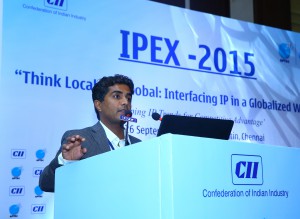Last month, I spoke at the 6th edition of the IPEX-2015 conference in Chennai from 25-26 September. This meeting, organised by the Confederation of Indian Industry, brought together thought leaders from the government, industry, and academia. Through my talk, I shared the UK’s best practices in intellectual property (IP) prosecution and enforcement. 
On prosecution, I highlighted the different routes available to applicants to accelerate the processing of patent applications with the UK intellectual property office. For instance, the Green Channel, introduced in 2009, allows for expedited processing of environmentally-friendly inventions. The Patent Cooperation Treaty (UK) fast track is another option if the claims in the patent application have been previously accepted either in an international preliminary examination report or written opinion of an international searching authority. The Global Patent Prosecution Highway, launched in 2014, is a consortium of select country patent offices from around the world; these offices have formally agreed to cooperate in accelerated patent application processing. Through this highway, applicants whose patent claims have been accepted by one participating office may request acceleration of one or more co-pending applications at any or all of the other participating offices.
At the end of the day, as I was leaving the conference venue, I ruminated about the influence that a robust IP system would wield on patent prosecution strategies of applicants and enforcement practices. Any thoughts?
